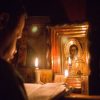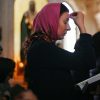Often when we speak to children they ask us about the nature of heaven. “What is heaven like?” Even adults often wish to catch a glimpse into this mysterious reality. Yet, the Lord Jesus Christ in His earthly ministry, often gave His disciples and the people who came to hear Him, a sneak peek into the nature of these mysteries such as the kingdom of heaven. He does this in today’s reading. He tells us something about the nature of things in the kingdom of heaven.
Our Lord who loves mankind, tells us that the kingdom is like a king who wished to settle accounts with his servants. He found that his servants could not pay their debts which they owed and so he generously forgave them and wiped away their debts to him. However in the parable we find that there is a wrinkle. All is not well. One of the servants who was forgiven all of his outstanding debts that were owed to the king, went out from his meeting where the king had just forgiven him and he in turn found one of his servants who owed him a very small amount. He grabbed him and began to choke that lesser servant and said to him “pay what you owe!” So the servant pleaded with him and said, “have patience with me and I will pay you.” But the first servant refused and put him in prison until he should pay the debt.”
Upon seeing this, the other servants who were standing nearby went and reported what had happened to the king. And then the king summoned that servant and said to him “You wicked servant! I forgave you all that debt because you pleaded with me. And should you not have had mercy on your fellow servant, as I had mercy on you?” And we are told that in anger the king delivered him up to the jailers until he should pay all his debt. And then we get the moral of the story: “So my heavenly Father will do to every one of you, if you do not forgive your brother from your heart.”
We are reminded by the Lord Jesus that forgiveness is not a matter of opinion or feelings. It’s not really about what we want to do. It is about what we need to do for our own health and well being, as well as the well being of others. Forgiveness is a life or death conscious decision. Of course we are speaking about spiritual life or spiritual death.
Forgiveness is a foundational aspect of the life of a Christian. It was forgiveness that the Lord demonstrated when He hung on the cross for us. It was forgiveness that was given to us as a gift at the time of our baptism into Christ. It is forgiveness that is offered to us daily when we repent and pray to God and when we come and receive the sacrament of confession. We have received so much by the grace of God. No matter what others have done to you in your life, they have not done anything compared to what we have done against God. Not even close. According to St. John Chrysostom, this is precisely why the debt owed to the king is much greater than the debt owed to the servant. People may sin against us but it is rather infrequent, yet according to St. John, we openly sin against God who is watching all the time and knows all things!
My brothers and sisters, if we search our hearts we might find that we are angry with others, hurt by them. We can see that our society is more angry as a whole. It is also the case that this wretched pandemic has further divided people. God is giving us plenty of opportunities to learn this blessed work of forgiveness. Perhaps it is because people do not forgive one another that they are so angry. Perhaps it is because we don’t forgive one another and we don’t reflect the reality of God’s radical forgiveness. But how can we reflect this reality unless we first embrace it and accept that God has indeed forgiven us? We have to acknowledge the work of God in our lives. How He has wiped away our sins and refashioned us in the image of His Son.
It is very hard to live a perfect life, to live without offending or being offended by others. Yet through forgiveness, every door to godliness is open to us.
Who should we forgive? We should start by forgiving those who are closest to us. Typically they are the ones that we feel the most resentment towards. It is sad to see husbands and wives at enmity with one another. It does not please God. God designed them to be one in Christ. To be welded together through His love. Yet often it’s the case that they are angry with one another and harbor resentments and bad feelings, sometimes for many years or decades. What a pitiful condition! It is also sometimes the case between parents and their children, between friends and between members within the body of Christ, the Church.
Each year I am struck by the beauty of Forgiveness Vespers that we celebrate right before we plunge into Great and Holy Lent. It’s such wonderful moment in the life of the church because each person humbles themselves before every other person and forgives them and embraces them from the depths of their heart. We do this without asking questions or explaining ourselves or figuring things out or deciding who should forgive whom. We all join in expressing our mutual brokenness and mutual need for mercy.
We don’t have to wait until forgiveness vespers to reconcile with those around us. Sometimes the best reconciliation happens when we humble ourselves and go and ask forgiveness of others. We may feel that others owe us or should ask our forgiveness but still we can start down the path. We may not even know what we have done to others but asking them to forgive us goes a long way towards opening the pathways of grace to work in the heart. Instead of being enclosed in a prison of resentment and scorekeeping, the heart is opened to receive and give mercy and forgiveness.
Often I’m asked, “Father, how do you deal with someone when they hurt you?” My first answer is to pray for them. Remember them by name and bring them to God. In that way we become like the saints and intercede on behalf of others. We also become like God Himself. Today’s parable is an invitation to choose. Either be like God and dwell with Him forever or choose to be unlike God, to be refused by God, and thrown into a prison of your own making, built upon all of your resentments and pain and all of your personal injustices. A place where we can not be reached by God. At the same time, we force people to stay locked in the prison that we have created by choosing not to forgive them. We hold them captive and make them victims instead of liberating them with love, as God has liberated us. Choose wisely my brothers and sisters.
I pray that we will choose to cultivate a merciful disposition beginning with our own faithful repentance, convinced that God is merciful and full of forgiveness. As St. Gregory of Sinai writes,”God immediately forgives everything to those who ask forgiveness in a spirit of humility and contrition and who ceaselessly invoke His holy name. As the Psalmist says, ‘Confess to the Lord and call upon His holy name’ (cf. Ps. 105:1).”
May this be for us a taste of His mercy, the true nature of the kingdom of God. And having tasted of this kingdom, may we choose to dwell within it and invite others to do so. Glory be to God forever AMEN.

















